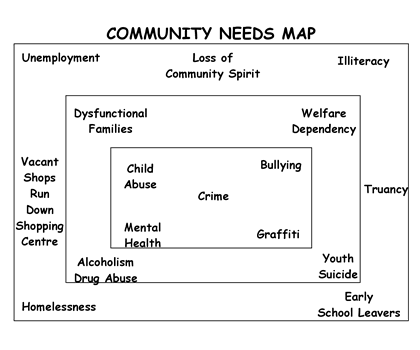What is Asset Based Community Development?
ABCD is the practice of seeking out the strengths and gifts that are within a community for the purpose of building a sustainable and healthy community. The approach focuses on building the assets of local residents, highlights the power that local associations have within a community, and reminds that the role of local institutions is to support the work of community.
So that's it in a nutshell. Of course there's a lot to unpack in that definition and let me venture to do so by using the next three blogs to share the top three reasons why I have been compelled to see ABCD multiplied in more neighbourhoods in Canada.
Reason #1 - The Glass IS Half Full I grew up in an under-resourced neighbourhood. I spent the majority of my life working or volunteering in under-resourced neighbourhoods/communities. While working in and living in under-resourced neighbourhoods my perspective and the general perspective of those around me was that these places were high needs area. Just listen to the terms used for these neighbourhoods, "priority needs," "at-risk," and "high risk." These communities are defined and perpetually described by deficiencies (affectionately termed a Neighbourhood Needs Map): broken families, welfare recipients, government housing, illiteracy, crime, unemployment, etc. These labels are then used to create policies and programs that are oriented towards deficiencies and not towards capacity.
It takes little imagination to see what the outcome is when neighbours of these communities are continually subjected to programs, services and activities that approach them as needs to be addressed and problems to be solved. Here are just a few results that occur when a neighbourhood is defined by its needs:
- the community becomes inundated and literally surrounded by systems, institutions and even businesses that are built on and supported by their others-defined deficiencies; this is evident by the prevalence of check cashing places, welfare offices, rent-to-own stores and other needs-based businesses and institutions in under-resourced neighbourhoods
- people begin to understand that in order to survive, in order to receive the services that are available to them, they will always need to be in a position of need
- neighbourhood residents can begin to accept this view of their neighbourhood and begin to view the place and people as, "victims incapable of taking charge of their lives and of their community's future" (Kretzmann & McKnight, 4, 1993)
Essentially the prevailing perspective of certain neighbourhoods being full of needs is very short-sighted and limited. It fails to account for the fact that the proverbial glass is actually half full and has capacity to be overflowing. ABCD challenges us to look at a community holistically. What if we looked at these neighbourhoods not based on what their needs were, but based on what their strengths, abilities, gifts, capacities and assets were? What if we began to speak about the innate gifts, abilities and talents that individuals had and their ability and power to contribute said gifts to the health and growth of their community? What would result if we began to locate these local people assets, connect these local people assets to other assets of the neighbourhood (namely associations and institutions that have power and resources to support community) and nurture these connections until they developed into power shifting, change and hope producing agents? When we begin to ask such questions we see another picture of the under-resourced community emerge. We create a space to dream, hope and build capacity with the reality that every person and neighbourhood is half full. We also highlight what before was obscure, that there is a power and capacity that is within that is more potent than the one without.
Note: For the sake of this blog post I've used the term "under-resourced" neighbourhood. I'm not sure I love that term, but I will use it until I find a term that more accurately describes the way I perceive these neighbourhoods.
---
Citation:
Kretzmann, John P., and John McKnight. Building Communities from the inside Out: A Path toward Finding and Mobilizing a Community's Assets. Evanston, IL: Asset-Based Community Development Institute, Institute for Policy Research, Northwestern U, 1993.



